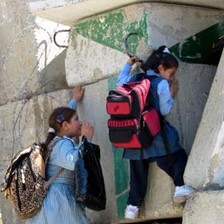Jerusalem 11 February 2003
How do I describe what life is like here - of the sadness in the eyes of my colleagues, of the exhaustion that results when every daily action requires an extraordinary effort, when perseverance is no longer enough and futility and despair fight for a place on the proud faces carrying bags and babies and the burden of poverty through checkpoints, over dirt piles, past soldiers and tanks and the bombed-out shells of buildings. On rainy days the muddy water swells around the feet, slowing passage. The soldiers stand in shelters and never seem to get wet under their helmets and uniforms and weapons, protected by arrogance and hatred and a state and an army and the world’s superpower. They pull people out of the battered Ford Transit vehicles that always seem to drive too fast to make up for lost time, jostling the school children and old men and mothers who ride in them, if they can afford the 3 shekel fare and if they are not males between the ages of 18 and 35 and if they have permission to enter Jerusalem and if there is no curfew or closure. The soldiers line them up, face to the wall, make them sit in the dirt, or stand in the rain or the scorching sun for minutes or hours while they chat on their mobile friends, joke with their friends, eat, smoke, laugh, abuse, with words and with actions.
How do I explain that when the wind blows it does not bring respite from the heat, but rather fills the mouth and the nose with grit, ripe with the smell of sewage and garbage and exhaust fumes. An Israeli woman asks “Why don’t they clean up their streets?” “Why do they live like animals?” And the children play in the refuse that can never be collected in villages and towns and cities which remain for hours and days and weeks and months under crippling curfews. Curfews which are enforced with a shoot-to-kill policy. Curfews which are not lifted during school hours. Curfews which prevent pregnant women from giving birth in hospitals, which stop ambulances in their tracks, which forced a Bethlehem family to live with the decaying corpse of their family member for days.
How can I express the feeling of death that lurks around every corner - of the children shot on their way home from school, of the old woman killed while sitting on her porch, of the people in Gaza killed in their homes when the bomb was dropped on their apartment building, of the refugees killed in their homes in Jenin when the tanks and the bulldozers ate up their camp, razing houses on top of their inhabitants, of people killed in taxis and on sidewalks when the Israelis carry out “preventive pinpointed killings”.
How do I tell the story of refugees made homeless for the 3rd or 4th time, of the woman who throws up her hands, in the middle of her house, with the gaping holes from the bulldozers in the wall, and the windows shot out by snipers, and the rooms filled with the debris of a family’s life, and begs me to tell the people of the US to please make it stop, this terrible nightmare. And wipes away my tears which I am ashamed to shed, and hugs me and gives me some of the precious drinking water that is so hard to come by in Rafah these days since the wells have been destroyed. And the people next door who invite us in for coffee, while sewage washes past the steps of their battered home which is sure to be demolished, standing as it is on the front line of Rafah, empty land where the next row of houses once stood. And the farmers chased from their olive trees by armed settlers and the people in Hebron who live with sandbags blocking their windows because the settlers have shot the glass out so many times, and my colleague who only sees his 4 adoring children, once a week, because the closures make the distance between his home and his work, just 30 KM apart, a 4 hour journey.
How can I show the faces behind the statistics – 70% unemployment, 75% poverty, 13% malnutrition in children under five. The number of dead, and injured, and blinded, and handicapped, in wheelchairs, and hospital beds and orphaned and homeless. The children that play funeral in the schoolyard, or ambulance stopped at the checkpoint, or soldier abusing passersby. The number of school days missed and the number of schools invaded and closed and the number of teachers who can’t get to work and the number of students who can’t afford to return to university. And the number of people in administrative detention, held without charge, without trial, without lawyers, without family visits, in tents without adequate food and water and sanitation and protection from the elements. And the number of trees uprooted, and dunums of land raised and kilometers of bypass roads built and wells destroyed. And of the courage and the dignity and the determination and the family who rebuilds their house again and again, each time it is demolished. And of the fear and the loss and the humiliation and the despair that has robbed even the living of their lives.
Lucy Mair works for Grassroots International, a US-based progressive funding and solidarity organization which provides support to eight Palestinian NGOs in occupied Palestine.
